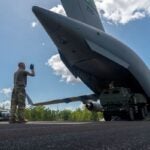Payton Says If GPS III Contract Award Had Been Protested, Air Force Still Was Set To Let Winner Commence Work On Critically Needed Satellites NEW YORK -- The Department of Defense can lessen the chance that defense contractors will protest contract awards to rivals, if requirements for new hardware are precise and unambiguous, without vague or descriptive terms, the top Air Force procurement official said. The key lies in crafting requests for proposals (RFPs) with greater care, said Gary Payton,…
Contract Updates
Intertrade Limited (Cedar Rapids, Iowa) – $9,272,637
Intertrade Limited, Cedar Rapids, Iowa, has been awarded a maximum $9,272,637 firm-fixed-price contract for F-16 generator controls. This was a sole-source acquisition using justification 10 U.S. Code 3204 (a)(1), as stated in Federal Acquisition Regulation 6.302-1. This is a four-year…
Cottonwood Inc. (Lawrence, Kansas) – $44,370,000
Cottonwood Inc.,** Lawrence, Kansas, has been awarded a maximum $44,370,000 firm-fixed-price, indefinite-quantity contract for aircraft cargo tie down straps. This was a sole-source acquisition using justification 10 U.S. Code 3204 (a)(5), as stated in Federal Acquisition Regulation 8.7. This is…
Teva Pharmaceuticals USA Inc. (Parsippany, New Jersey) – $46,087,497
Teva Pharmaceuticals USA Inc., Parsippany, New Jersey, has been awarded a maximum $46,087,497 modification (P00009) exercising the third one-year option period of a five-year base contract (SPE2DP-20-D-0002) with five one-year option periods for adenovirus type 4 and type 7 vaccines.…
Northrop Grumman Systems Corp. (Oklahoma City, Oklahoma) – $64,111,631
Northrop Grumman Systems Corp., Oklahoma City, Oklahoma, has been awarded an estimated $64,111,631 delivery order (SPRTA1-26-F-0034) and modification (P00015) to a four-year subsumable base contract (SPRTA1-19-D-0001) with one five-year option period for additional pricing for the manufacture and production of…













